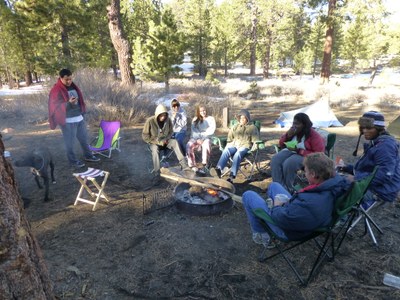Leadership #1: Astronomy Program
Olympic High School Astronomy Program
Overview: Marginalized, at-risk urban youth seldom have opportunities to experience nature, yet 21st century environmental and conservation issues regularly find there way into our national conversation. Since environmental issues have become a regular presence in both in the media and political spheres, how do those not exposed participate in the discussion? The term ‘nature deficit,’ has been bandied about for years and alludes to the scenario encountered when examining the experience of secondary students at Olympic High School. We wanted to provide a simple, safe outdoor experience tied to a standards-based Earth Science Unit about Astronomy.
Pre-requisite training and planning: Student enrolled in the science program are all given the opportunity to enroll in and take the pre-requisite Earth Science B (second Semester) unit, which is a requirement for going on the Astronomy campout. Classroom instruction is supplemented by weekly (weather permitting) telescope viewing at the school that generally focus on planets and the moon. Students must complete 4 out 5 Earth Science credits through class work and 4 telescope viewings to be eligible for the trip. Those students attending the campout receive their 5th credit upon completion of campout.
Grants from the Santa Monica education Foundation enabled the program to purchase a small 60mm Meade telescope, as well as creating an ongoing fund to pay for the rental of a van and assorted necessary camping equipment. Students are asked for a donation of $30 to cover food and gas expenses, but financial accommodations are made for any student unable to contribute. All students spend time at school learning (from student leaders) how to pitch a tent and how and what to pack. Focus is on comfort and enjoyment. Letters to parents are thorough as to location and timeline, availability of cell reception, suggested layering of clothing, medication needs and other essentials.
Event: Camping trip is scheduled for a Friday before a new moon (this permits better ‘seeing’), and involves approximately 10-15 students. Founder and another credentialed teacher are always present and two-three parents are also in attendance. Location is the Chula Vista campground located on the summit of Mt.Pinos, California.
involves approximately 10-15 students. Founder and another credentialed teacher are always present and two-three parents are also in attendance. Location is the Chula Vista campground located on the summit of Mt.Pinos, California.
Students and staff and parent chaperones arrive around mid-day, spend 2-3 hours setting up tents then participate in a founder-led safety meeting and science lesson about daytime ecology of the area. After sunset hike to the top of mountain (all are invited, but one staff member always stays at base camp for those unable to make the hike), dinner is prepared communally and hot dogs and Smores proliferate. At 10:00 PM, when darkness is total, students walk over to the parking lot that is usually filled with 20-50 large telescopes being used by different members of the public. Students are given the opportunity to introduce themselves and ask questions of the astronomers.
Reflection: This year will mark tenth anniversary of the Astronomy trip. Over the years the program has been given enough donations of tents and assorted equipment to make the experience a very comfortable one. Whereas renting the equipment used to be a time consuming and expensive affair it is no longer necessary. Each year the trip grows in size and this year we hope to take 13-15 students and at least 3 credentialed teachers and two parent chaperones. In the planning stages are a possible multi-day backpacking trip through the Eastern Sierra range next summer.
CPSEL Connection
Standard 1: Facilitating the development, articulation, implementation and stewardship of a vision of learning that is shared and supported by the school community
1.1: Develop a shared vision
1.2: Plan and implement activities around the vision
1.3: Allocate resources to support the vision
Standard 2: Advocating, nurturing, and sustaining a school culture and instructional program conducive to student learning and staff professional growth
2.1: Develop school culture and ensure equity
2.2: Guide the instructional program
Standard 4: Collaborating with families and community members, responding to diverse community interests and needs, and mobilizing community resources
4.1: Collaborate to incorporate the perspective of families and community members
4.2: Establish and manage linkage between the site and the larger community context
Standard 5: Modeling a personal code of ethics and developing professional leadership capacity.
5.1: Maintain ethical standards of professionalism
5.3: Model reflective practice and continuous growth
Standard 6: Understanding, responding to, and influencing the larger political, social, economic, legal and cultural context
6.1: Engage with the policy environment to support school success
6.2: Interact with stakeholders
6.3: Incorporate input from the public

